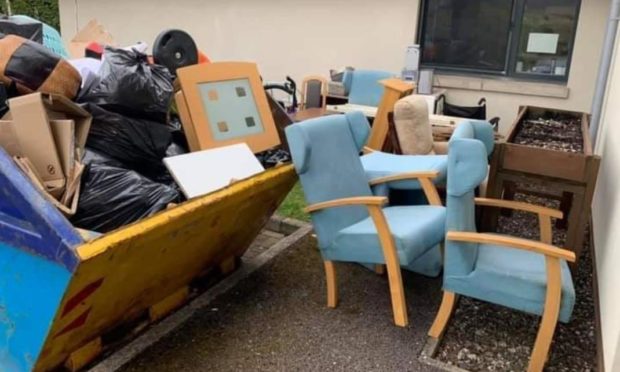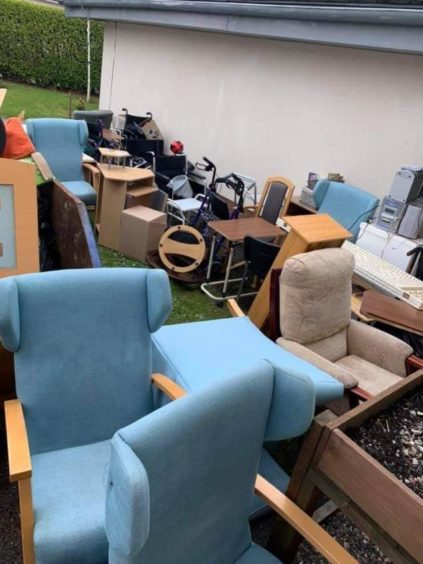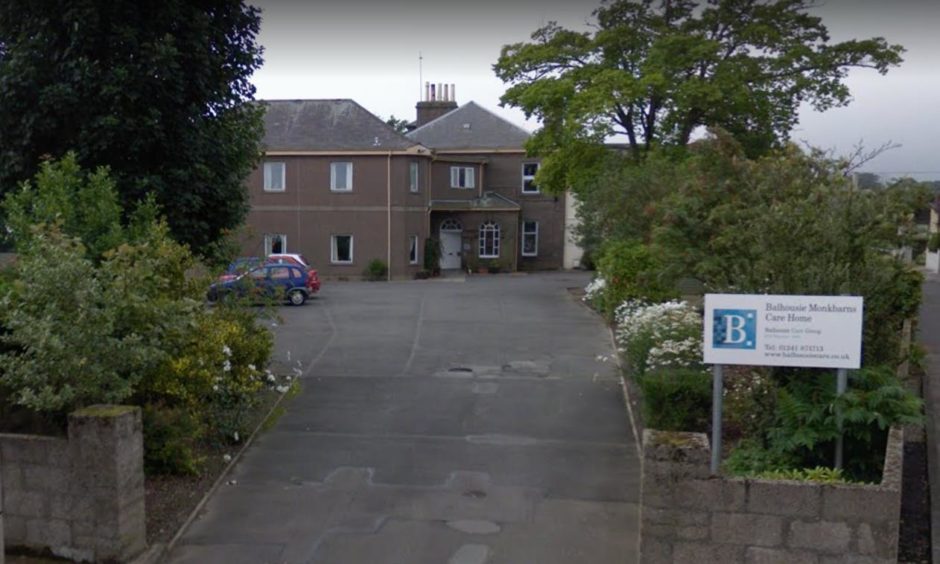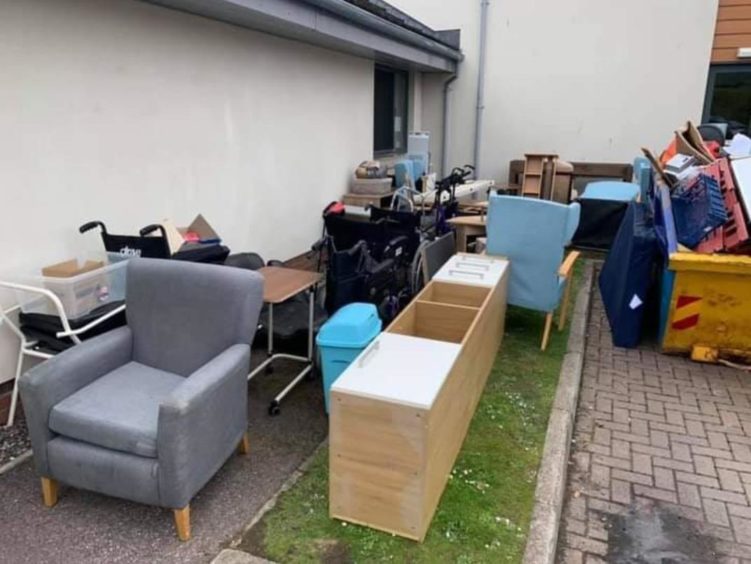A damning report by the Care Inspectorate has demanded an Arbroath care provider drastically improves hygiene standards.
The unannounced visit on May 14 to Monkbarns Care Home found multiple issues with cleanliness, finding the standard to be “poor” and require urgent attention.
Operators Balhousie Care Group said that the findings on infection control practices were “disappointing and fall short of what we expect”.
Following the visit, piles of furniture and other items were seen alongside skips of rubbish at the home, which is in Monkbarns Drive.
The report said the home was “cluttered with soft furnishings and other items that could not be routinely cleaned”.
‘Contaminated with bodily fluids’
Mattresses were found to be dirty and in such a bad state they needed to be thrown out.
Inspectors said this posed a risk of cross-contamination, and “also risked people’s skin integrity, their rights, dignity and respect”.
Some furniture including toilet risers and shower seats were damaged or were “contaminated with body fluids”, inspectors found.
Covid-19 transmission
The report found that “the systems and processes in place to deliver and provide assurance that the home was cleaned to an acceptable standard to minimise the risk of transmission of Covid-19 from exposure to the environment were not good enough”.
This was said to be shown through the amount of “environmental dust noted throughout all areas of the home”.
Staff were not always disposing of their personal protective equipment (PPE) in appropriate bins, which could cause risks to staff, people living in the home, and visitors.
‘Cluttered and chaotic’
The report said: “Sluices and domestic storage rooms were cluttered and chaotic with a mixture of things like bandages, dressings, urine bottles, basins and other equipment stored together.
“We found that the sinks were not clean and there were large amounts of dust which had accumulated in certain areas such as on top of and beside cupboards.
“Shared equipment such as food serving equipment, cutlery and storage containers were not clean.
Cleanliness in areas of home ‘poor’
“Overall, levels of cleanliness in areas of the home were poor and required robust attention to help minimise the potential spread of infection.”
The reports said that over the course of the inspection, “significant progress had been made to address the concerns”, with damaged furniture and equipment thrown out, areas of the home decluttered, and a focus on cleaning communal areas.
However, inspectors noted that “this was a work in progress and some areas were still not clean enough” and made a requirement that it be further improved by Friday May 28.
Mattresses thrown out by manager
The manager immediately conducted an audit of all mattresses and covers in the home and replaced those found to be contaminated, the report noted.
Inspectors said: “The management of clinical waste was not satisfactory which caused risks to staff, people living in the home and visitors.
“All clinical waste must be appropriately stored out of public access in accordance with HSE (Health and Safety Executive) and NIPCM (National Infection Prevention and Control Manual) guidance to minimise the risk of exposure to infection.”
Clinical waste bins not locked
Clinical waste includes syringes, needles or other sharp instruments which, unless rendered safe, may prove hazardous to any person coming into contact with it.
It also includes drugs or other pharmaceutical products, swabs or dressings, and any human or animal tissue.
The report said: “The clinical waste storage bins used by the home were not locked. The manager immediately addressed this and we were satisfied that appropriate action was being taken to make these safe and secure.
“We determined that there was no shared sense of responsibility, or clarity, amongst staff about their roles in ensuring the environment and the equipment were clean and free from infection.
‘Increased the risks of infection’
“All of these issues increased the risks of infection to everyone in the home.
“People experiencing care were not appropriately protected because there was not adequate cleaning of the care home.”
Other criticism included staff “not being present for long periods of time” in communal areas, meaning “there was little social engagement in the lounges, which resulted in people not moving for long periods and falling asleep”.
Number of requirements made
Requirements for Balhousie Care Group to have carried out by May 28 included ensuring that the facility was safe, well-maintained and minimises the risk of infection.
To do this, bosses were told they must “ensure that the premises, furnishings and equipment are clean, tidy, and well-maintained”.
Enhanced cleaning schedules and regular quality assurance checks were to be put in place, as were safe infection control practices.
‘Robust audits’
Clinical waste was ordered to be stored safely and disposed of properly.
“Robust audits” of all mattresses are to be carried out and any found to be contaminated are replaced immediately.
Audits of equipment used by people and cleaning records must be also be kept to ensure good standards of cleanliness in the home.
Balhousie: ‘Findings are disappointing’
A spokeswoman said today: “As a care provider that prides itself on its standards of care, the Care Inspectorate’s findings on infection control practices at Monkbarns were disappointing and fall short of what we expect.
“As detailed in the report, staff and management responded immediately to the visit’s findings to address the areas of concern raised.
“We continue to work with the Care Inspectorate to ensure that its requirements are not only met but exceeded.
“Our residents and their wellbeing is our priority. To that end, we note the ‘positive and compassionate’ engagement Care Inspectorate inspectors witnessed between staff and residents on their visit, and the unanimously positive feedback from residents and relatives they spoke to.”



